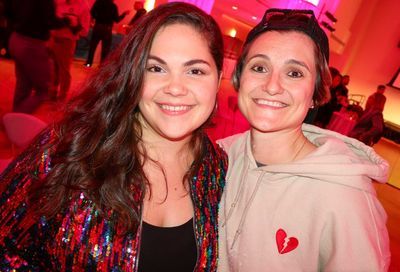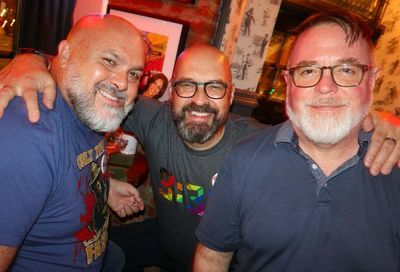Elektrafying
Helmed by a strong cast, Richard Strauss' 99-year-old opera, 'Elektra,' is an ode to the murderous slice and dice
As anyone with a pulse knows, Hollywood — both the A and the B list — continues to outrage the arbiters of good taste with an increasingly flamboyant passion for blood; be it Sweeny Todd, No Country for Old Men, or Saw III, it is all about the blood. Sprays of it, rivers of it, even a fine mist of it will do. If you don’t leave the theater feeling as if you’ve just taken a bath in hemoglobin, you didn’t get your money’s worth. Blood is the medium of the day and the line between art and exploitation is razor thin, pun fully intended. And yet, as is so often the case with such so-called harbingers of civilization’s end, it has all been seen and clucked over before. Unadorned bloodlust as entertainment, either lowbrow or highbrow, has been around for eons, along with its ability to shock, enthrall and disturb.

Revenger’s tale: Bullock and Goerke
(Photo by Karin Cooper)
Take, for example, the Washington National Opera’s season-closer of Elektra. Devoid of computer-generated eviscerations or anatomically accurate ketchup-engorged rubber throats — indeed not a single drop of blood falls upon the stage — this 99-year-old opera is a veritable ode to the murderous slice and dice. It is a conjuring, a longing, a dissection, if you will, of blood-soaked revenge. Composer Richard Strauss, who also wrote such traditionally melodic and narrative-driven operas as Der Rosenkavalier, like these auteurs of today, saw the envelope and wanted to push it. With Elektra, Strauss left behind the fairy tales and instead engaged with gritty human realities. Musically, likewise, he exchanged the easily-digestible for the expressive and unsettling possibilities of atonality.
And the Elektra at the center of this maelstrom is as fascinatingly discordant as the piece itself. Looking like an angry German teenager with a taste for anarchy and possibly women, Susan Bullock is anything but a traditional operatic heroine. When she is not scowling and lurking, she is gnashing her teeth and performing somewhat alarming war dances. When she is not scheming to bring about the gory death of her mother and her consort, she is preying creepily on her sister. And yet from this tortured soul comes the lovely sound of Bullock’s soprano moving with power, beauty and pain within the dissonance. And despite some moments that border on the hammy, her wild miming of relief and turmoil at the discovery that her brother/savior is alive, is quite moving. This is a role Bullock has sung often and she crafts a disturbing and memorable presence, one that draws the viewer inexorably deeper into her internal fray.
The strong cast continues with Christine Goerke singing Chrysothemis, Elektra’s younger sister, a woman clothed both physically and emotionally in the traditional female trappings of skirt hoops and baby-lust. The bearer of an exceptionally clear and brilliant sound that pierces the heart with its pathos, Goerke is a spectacular soprano. Mezzo-soprano Irina Mishura sings Elektra’s mother, Klytemnastra, with reptilian aplomb, her voice and mannerisms dripping with the corruption of her soul. In the smaller but highly pivotal role of Elektra’s brother, Orest, bass Daniel Sumegi brings vital gravitas and the recognition that, done right, one need barely move to generate essence. He sings with gorgeous resonance, blending his deep tones with the musical darkness of the piece.
Playing May 15, 18, 21, 24 and 27
Kennedy Center
Opera House
$55-$295
202-295-2400
www.dc-opera.org
Director David Kneuss keeps this production operating at fever pitch accentuated wonderfully by Robert Israel’s luridly colored, sometimes quivering, old/modern set. The nightmarish mood is heightened further (especially for government employees) by Klytemnastra’s horde of ID-wearing bureaucrats in sensible heels.
It its original era, Elektra no doubt must have offended more than a few sensibilities. Seeing it now, we have the benefit, in our desensitized age, of moving beyond the shock-value to the piece that lies beneath. Elektra is the kick and claw of human to the emotional cliff-edge of revenge — and then the bloody fall itself.
Support Metro Weekly’s Journalism
These are challenging times for news organizations. And yet it’s crucial we stay active and provide vital resources and information to both our local readers and the world. So won’t you please take a moment and consider supporting Metro Weekly with a membership? For as little as $5 a month, you can help ensure Metro Weekly magazine and MetroWeekly.com remain free, viable resources as we provide the best, most diverse, culturally-resonant LGBTQ coverage in both the D.C. region and around the world. Memberships come with exclusive perks and discounts, your own personal digital delivery of each week’s magazine (and an archive), access to our Member's Lounge when it launches this fall, and exclusive members-only items like Metro Weekly Membership Mugs and Tote Bags! Check out all our membership levels here and please join us today!























